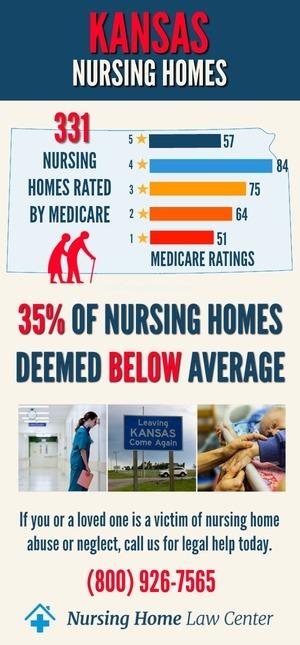The Nursing Home Law Center is committed to providing the legal resources necessary to hold negligent facilities accountable.
Kansas City Nursing Home Abuse Lawyer

Licensed in Missouri
When families entrust a loved one to the care of a nursing home, they expect them to receive proper care, compassion, and attention. Unfortunately, nursing home abuse remains a serious issue in Kansas City and across the country.
If you suspect that a family member or elderly loved one is being mistreated in a nursing facility, it is critical to seek immediate legal assistance. A Kansas City nursing home abuse lawyer can help you report nursing home abuse, protect your loved one from further harm, and pursue financial compensation for their injuries.
Why Hire Nursing Home Law Center
At Nursing Home Law Center, we are dedicated to obtaining justice and fair compensation for victims of nursing home abuse. Our skilled legal team has a strong history of successfully managing nursing home abuse claims with care and securing substantial verdicts and settlements.
We carry out detailed investigations to ensure all aspects of abuse—such as medical costs, emotional distress, and other damages—are thoroughly accounted for. With extensive knowledge in handling nursing home neglect or abuse cases, we efficiently tackle legal challenges and work relentlessly to safeguard your rights.
We offer compassionate and clear guidance throughout the process, ensuring you and your loved ones feel supported, protected, and confident.
Types of Cases Handled by Our Kansas City Nursing Home Abuse Lawyers
Nursing home abuse refers to any intentional harm or neglect inflicted on elderly residents by caregivers or staff members in a nursing facility. This mistreatment can take many forms, each with devastating effects on the health and well-being of the victim. Our Kansas City nursing home abuse lawyers handle a variety of cases that address the different types of abuse.
Physical Abuse
Physical abuse involves the intentional infliction of physical harm on nursing home residents. This assault can include hitting, slapping, kicking, or improper use of restraints.
Mental and Emotional Abuse
Mental and emotional abuse often involves verbal threats, humiliation, isolation, or psychological manipulation that causes emotional distress or fear in older adults.
Sexual Abuse
Sexual abuse in nursing homes includes any unwanted sexual contact or behavior inflicted on a resident, whether by staff members or other residents. Many elderly residents, particularly those with cognitive impairments, are especially vulnerable to sexual assault in nursing facilities.
Medical Malpractice
Medical malpractice in nursing homes covers instances of neglectful medical care, such as the development of bedsores, medication errors, and failure to provide proper medical attention. Nursing home patients rely on the staff for adequate medical treatment, and any lapse in this care can lead to serious health complications or even death.
Negligence
Negligence in nursing homes occurs when staff members fail to meet residents’ basic needs, including hygiene, nutrition, and safety. Cases may involve poor hygiene, malnutrition, dehydration, or elopement, where elderly patients wander off without supervision, placing them in immediate danger.
Financial Abuse
Financial abuse involves the exploitation of nursing home residents through the manipulation or theft of personal property, life insurance policies, or financial accounts.
Wrongful Death
In the most tragic cases, nursing home abuse or neglect can result in the wrongful death of a resident. Family members may seek justice through a nursing home abuse lawsuit to hold negligent nursing homes accountable and secure financial compensation for the loss of their loved one.
Understanding Your Legal Rights

Nursing home residents in Kansas City and across the country are protected by several federal and state laws designed to ensure their safety, dignity, and well-being.
One of the most important federal protections is the Nursing Home Reform Act of 1987. This law establishes a set of minimum standards of care for all nursing homes that receive Medicare and Medicaid funding.
The act guarantees residents the right to be free from physical, emotional, and sexual abuse, to receive proper medical care, to maintain personal hygiene, and to have access to social and legal services.
In addition to federal protections, Kansas also has state-specific regulations to protect nursing home residents. Kansas nursing homes must comply with state laws regarding staffing levels, resident safety, and medical care.
These state laws outline specific requirements for nursing home staff members to ensure they are adequately trained and equipped to care for elderly residents.
Eligibility to File a Claim
Various individuals can file a claim in cases of nursing home abuse or neglect. If capable, the victim of the abuse can take legal action to seek compensation. However, if the resident cannot advocate for themselves, a family member, legal guardian, or designated representative may file the claim on their behalf.
Liability in Nursing Home Neglect and Abuse Cases
Nursing home abuse cases can involve multiple parties who may share responsibility for the harm caused to a resident.
- Nursing Home Facility: The nursing home can be held responsible if it fails to provide adequate staffing, training, or supervision. If it neglects to maintain proper safety protocols, leading to abuse or neglect, it may be liable for any resulting harm to residents.
- Nursing Home Staff: Staff members, such as caregivers, nurses, or aides, can be directly liable if they physically abuse, sexually assault, or neglect elderly patients under their care. These individuals have a duty to provide proper care, and any breach of that duty may result in legal consequences.
- Nursing Home Administrators and Management: Administrators and management can also be held accountable if they fail to vet, train, or supervise their employees properly. If they ignore or cover up warning signs of abuse or neglect, they can be considered negligent and responsible for any harm to the residents.
- Third-Party Contractors: Some assisted living facilities outsource services such as medical care, cleaning, or security to third-party contractors. If these contractors neglect or abuse a nursing home patient, they can also be held liable.
- Pharmaceutical Companies or Medical Providers: In cases of medication errors or medical malpractice, liability may extend to pharmaceutical companies or healthcare providers who supply improper medications or fail to offer appropriate treatment. If these errors lead to harm, they can be liable for negligence.
How Our Kansas City Nursing Home Abuse Attorneys Can Help

At Nursing Home Law Center, our nursing home attorneys are dedicated to protecting the rights of elderly individuals and securing justice for victims of abuse and neglect. With years of experience handling nursing home abuse cases, we understand the complexities of these claims and the emotional toll they take on families.
Our law firm has successfully represented countless families, helping them hold negligent nursing facilities accountable and obtain compensation for their loved ones’ injuries.
Free Case Evaluation
Our legal team offers a free consultation to review your case and determine the best action. We’ll listen to your concerns, evaluate the evidence, and explain your legal rights. This initial case evaluation allows us to guide you without financial obligation.
Case Investigation
We conduct thorough investigations into nursing home neglect cases, gathering critical evidence such as nursing home records, witness statements, and medical reports. By carefully examining the facts, we identify the parties responsible for the abuse, whether it involves physical abuse, financial exploitation, or medical malpractice.
Filing the Claim
Once we have gathered sufficient evidence, we’ll file a claim on behalf of the abused resident. This legal process involves submitting the necessary paperwork, negotiating with insurance companies, and taking the first steps toward holding the negligent nursing home or staff members accountable.
Settlement Negotiation
In many cases, nursing homes or their insurance companies may seek to settle the claim out of court. An experienced attorney will negotiate settlements that fully address the victim’s needs, including compensation for medical expenses, emotional distress, and other damages.
Trial Representation
Our attorneys are prepared to take your case to court if a fair settlement cannot be reached. We have extensive trial experience and will advocate vigorously on behalf of your loved one to ensure justice is served.
Common Signs of Elder Abuse Among Nursing Home Residents
There are 99 Medicare-approved nursing homes in Kansas City. Of these, 56 facilities (56.6%) have received a below or much-below-average overall score. Specifically, 57 nursing homes (57.6%) fall short in health inspections, and 55 facilities (55.6%) have inadequate staffing levels. 21 facilities (21.2%) were rated poorly regarding quality measures. [1]
The worst-rated nursing homes in Kansas City include:
| Alpine Breeze Health and Wellness | Armour Oaks Senior Living Community |
| Aspire Senior Living Platte City | Avalon View Health and Wellness |
| Baptist Homes of Independence | Bonner Springs Nursing & Rehab Center |
| Carmel Hills Wellness & Rehabilitation | Carnegie Village Rehabilitation & Health Care Center |
| Clara Manor Nursing Home | Delmar Gardens of Overland Park |
| Edgewood Manor Health Care Center | Excel Healthcare and Rehab Overland Park |
| Garden Terrace at Overland Park | Good Samaritan Society – Olathe |
| Gregory Ridge Health Care Center | Hilltop at Blue River |
| Ignite Medical Resort Carondelet LLC | Ignite Medical Resort Rainbow Boulevard, LLC |
| Independence Manor Care Center | Jefferson Health Care |
| Kaw River Care and Rehab | Lee’s Summit Place |
| Medicalodges Leavenworth | Medicalodges Post Acute Care Center |
| Merriam Gardens Healthcare & Rehabilitation | Parkview Healthcare |
| Parkway Health Care Center | Prairie Ridge Health & Rehabilitation |
| Rehabilitation Center of Independence | Rehab of Kansas City South |
| Riverbend Post Acute Rehabilitation | Rosewood Rehab and Healthcare Center |
| Seasons Rehab and Healthcare Center | Shawnee Post Acute Rehabilitation Center |
| Shangri-LA Rehab & Living Center | Sunrise Nursing & Memory Care |
| The Healthcare Resort of Kansas City | Tiffany Springs Rehabilitation & Health Care Center |
| Wilshire at Lakewood Rehab Center |
Recognizing the warning signs of elder abuse in a nursing home facility is crucial to ensuring the safety and well-being of your loved ones. Unfortunately, an elderly person may be unable or unwilling to communicate their mistreatment due to cognitive impairments or intimidation from nursing home staff.
It is essential to stay vigilant for the common signs of abuse and neglect, which can often manifest in various ways, such as:
- Unexplained injuries, such as bruises, cuts, broken bones, or head injuries;
- Sudden behavioral changes;
- Poor personal hygiene, including unwashed hair, dirty clothing, and foul odors;
- Bed sores (pressure ulcers);
- Signs showing lack of proper nutrition or dehydration, such as significant weight loss, dry skin, or cracked lips;
- Unusual financial transactions, missing personal property, or sudden changes in life insurance policies or wills;
- Fear of certain staff members or other residents;
- Unsanitary or unsafe living conditions, such as dirty rooms, lack of proper medical care, or insufficient heating and cooling.
What to Do If You Suspect Nursing Home Abuse
If you suspect that a loved one’s injuries are a result of nursing home abuse, it’s essential to act quickly to protect them and hold the responsible parties accountable. Here are the steps you should take to address the situation:
- Call 911 if there is immediate danger
- Report abuse to the nursing home administrator or management
- File a complaint with your local ombudsman’s office
- Contact a nursing home abuse lawyer
Damages You Can Recover Through a Nursing Home Abuse Claim
When filing a nursing home abuse claim, victims and their families may be entitled to recover a variety of damages to compensate for the harm suffered.
Economic damages are meant to compensate for the tangible financial losses associated with nursing home abuse or neglect. Examples include:
- Medical expenses
- Relocation costs
- Lost wages
Non-economic damages compensate for the more intangible consequences of nursing home abuse on the victim and their family, including emotional and psychological abuse. Examples include:
- Pain and suffering
- Loss of enjoyment of life
- Emotional distress
Punitive damages are awarded in cases of especially egregious or malicious conduct. These damages are meant to punish the responsible parties for their actions and deter similar future behavior.
The Cost of Hiring a Kansas City Nursing Home Abuse Lawyer
At Nursing Home Law Center, we understand that financial concerns can be a major hurdle for families seeking justice for their loved ones. That’s why our nursing home abuse lawyers work on a contingency fee basis.
This arrangement means that you pay no upfront costs for legal representation; our law firm only gets paid if we successfully recover compensation on your behalf.
You Have Limited Time to Take Legal Action in Kansas City
In Kansas City, as in the rest of Missouri, the statute of limitations for nursing home abuse cases typically allows you up to five years from the date of the abuse or neglect to file a claim.
However, this timeframe can vary depending on the specifics of the case, such as whether the abuse resulted in wrongful death or if the victim has a mental condition that might extend the filing deadline.
You may lose your right to pursue compensation entirely if you miss this legal deadline. It’s critical to consult with an experienced Kansas City nursing home abuse lawyer as soon as possible to ensure your case is handled on time and your legal rights are protected.
Call (800) 926-7565 Toll-Free for a No Obligation Consultation
Contact a Kansas City Nursing Home Abuse Attorney Today!
At Nursing Home Law Center, we have years of experience representing victims of nursing home abuse and neglect. Our dedicated legal team has a proven track record of securing justice and compensation for residents and their families. We understand the emotional toll that abuse takes, and we are committed to holding negligent nursing facilities accountable.
If you suspect your loved one is suffering from abuse or neglect in a Kansas City nursing home, don’t wait to take action. Contact us today to schedule your free consultation and take the first step toward justice.
Call us at (800) 926-7565 or fill out our contact form.
References: [1] Medicare


